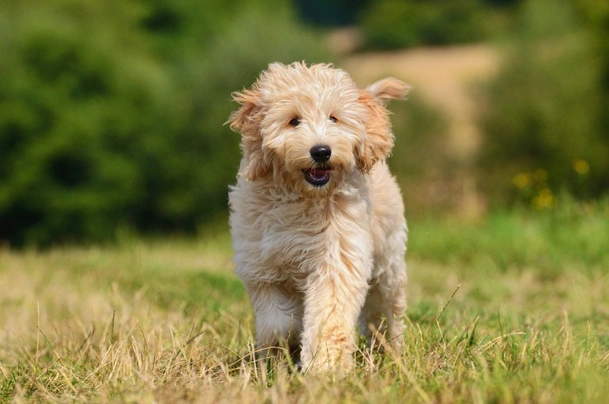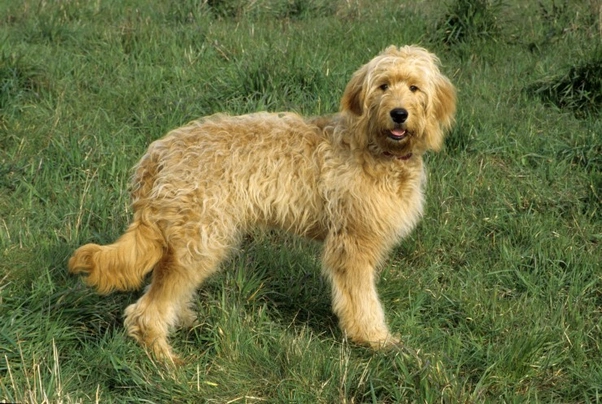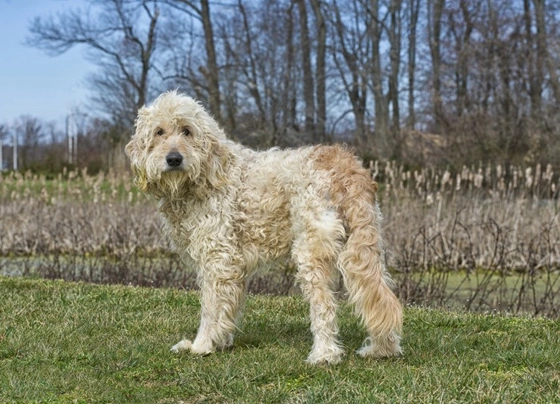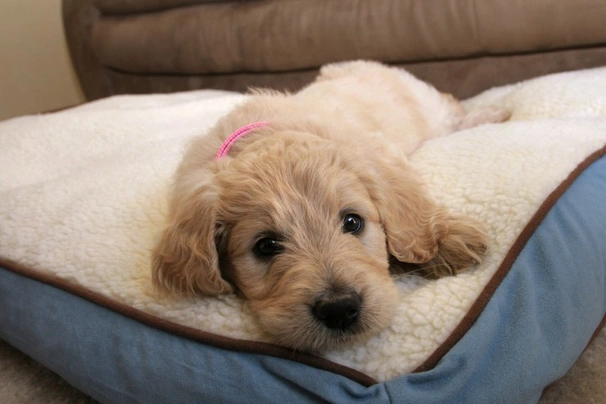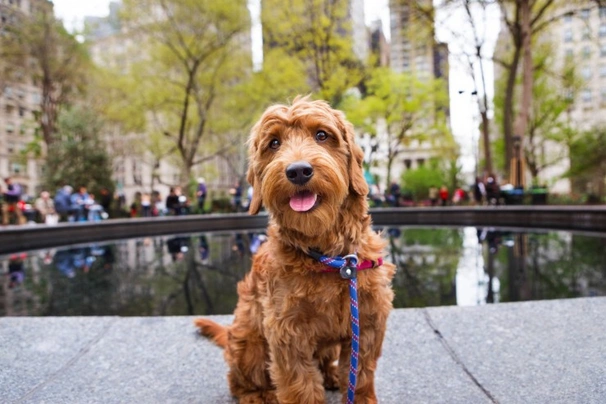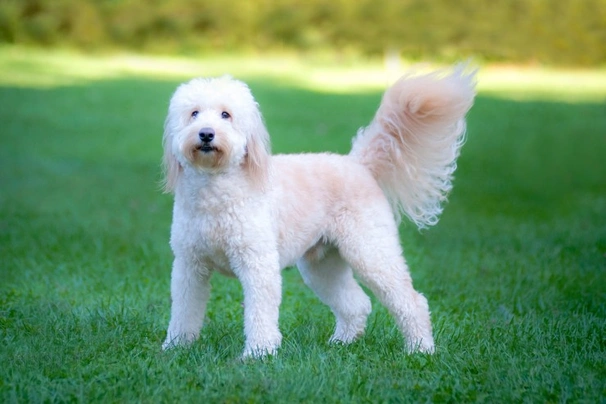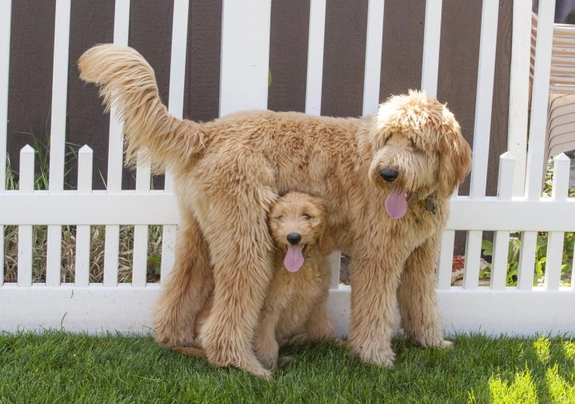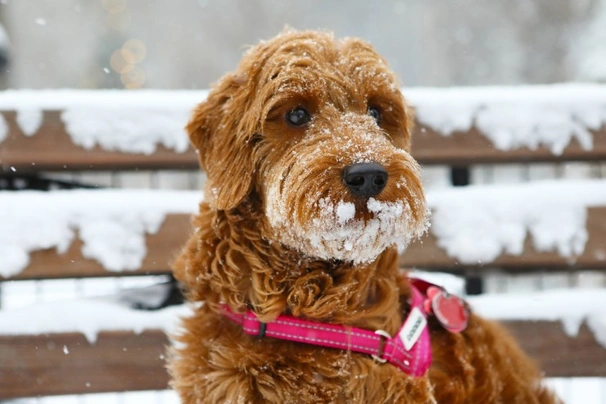Goldendoodle
Pros
Cons
Introduction of the Goldendoodle
The Goldendoodle is a cross between a Golden Retriever and a Standard or Miniature Poodle both of which are pure breeds. Over the years they have become one of the most popular family pets and companion dogs on the planet which is highly understandable given their good looks and charming loyal natures. They are not recognised by The Kennel Club as a breed (September 2017) but many breed clubs have been established both here in the UK and elsewhere in the world to ensure these handsome dogs continue to be bred responsibly.
It's worth noting that a Goldendoodle's parent breed's ancestry is that of a hunter and water dog and that they can have shaggy coats much like that of a Retriever or a relaxed curl type coat that resembles that of a Poodle with many Goldendoodles having a coat that's somewhere in between the two. Today the Goldendoodle which is also sometimes referred to as a Groodle remains not only a wonderful family pet but they are also very versatile and highly valued working dogs too. They are wonderful PAT dogs and have helped handlers as service dogs too. Goldendoodles are gentle patient and extremely affectionate by nature and thrive on human company which are just some of the reasons they have become so popular throughout the world.
History of the Goldendoodle
The Goldendoodle is one of the newest additions to the fast growing list of crossbreeds that have appeared on the scene over recent years. The idea behind crossing Poodles with Golden Retrievers was to create a larger "doodle-type" dog that also boasted being low shedding and a dog that was both highly intelligent and affectionate that would make them not only ideal pets but assistance dogs too and more especially for people who suffered from allergies.
They wee given their name by an American family called the Neelands in 1992 when they told someone their dog called Sugar was not a Labradoodle but a Goldendoodle and so it was that the name stuck.
These charming dogs have become extremely popular in many countries of the world and more especially in Australia. However as yet they are not recognised by The Kennel Club or other international breed clubs around the world (September 2017) but many local clubs have been established with an end goal being to continue to breed healthy Goldendoodles in the most responsible way and to achieve a consistency in their looks and personalities.
Interesting facts about the breed
- Is the Goldendoodle a vulnerable dog? No they are one of the most popular new hybrid dogs to have been developed over recent times both in the UK and elsewhere in the world
- F1 Goldendoodles are a first cross of a Golden Retriever and a Poodle both of which are pure breeds
- F1B Goldendoodles are a cross between an F1 Goldendoodle and a Poodle
- F2 Goldendoodles are a cross between a F1 Goldendoodle and an F1 Goldendoodle
- F2B Goldendoodles are a cross between an F1 Goldendoodle and F1B Goldendoodle
- F3 Multi-Gen Goldendoodles are a cross between any of the following combinations any F2xF2 = F3
- Hybrid vigour in first generation Goldendoodles is better than it is further down the line and it is a breeding phenomenon which sees first crosses between two separate pure breeds producing healthier puppies than in the parent lines. The "vigour" deteriorates with every successive generation that's bred
Appearance of the Goldendoodle
Height at the withers: Males 61 - 66 cm Females 56 - 58 cm
Average Weight: Males 14 - 20 kg Females 14 - 20 kg
Goldendoodles come in all sorts of shapes sizes and colours with puppies in a same litter looking quite different because it depends on whether they throw more to the Golden Retriever or to the Poodle. However responsible breeders are trying to breed dogs that are not only healthy but which have more consistency in their looks and natures too. However there is no "breed standard" as such with some Goldendoodles having tight curly coats whereas other can have silkier flatter coats that resemble more that of a Golden Retriever rather than a Poodle. Some breeders try to create a "Teddy Bear" look about a dog's head which has proved very popular.
A Goldendoodle's overall look is one of a well-balance athletic nicely muscled dog whether they are small medium or larger in size bearing in mind that a puppy's size would depend on their parents. With this said they are nicely put together with dogs having a kind and alert look about their eyes if rather mischievous at times. They have athletic and graceful bodies that are quite square in shape and depending on the size of a dog they can show a medium to larger amount of bone.
They have large round and very expressive eyes surrounded with hair which forms charming eyebrows Dogs with brown pigments often have brown to dark hazel coloured eyes but in general a dog's eye colour matches and blends in with their face colour. The hair on their muzzles is long enough to form whiskers.
Ears are set high and moderately flat dropping down close to the side of a dog's head being covered in tight or loose curls. They have fleshy square large noses with the pigment being black or brown depending on a dog's coat colour. Sometimes a dog's nose can be freckled more especially if they have a particoloured coat. The Goldendoodle has a strong jaw with a perfect scissor bite where their upper teeth neatly overlap their lower ones.
Goldendoodles have well-muscled firm moderately long necks which should be slightly arched and which flow nicely into a dog's strong well angled shoulders. Front legs are long and straight and chests are well developed with dogs having nicely sprung ribs and slightly tucked up bellies which adds to their athletic appearance. They have nice level strong backs and powerful muscular back legs. Their feet are round and well-padded with strong nails. Tails are set quite high which dogs carry much like a sabre with a slight curl only which should never be exaggerated.
When it comes to their coat the Goldendoodle can have a tight or loose curly coat or they can have straighter flatter and silkier coats depending on whether they have thrown more to a Poodle or to a Golden Retriever. The most common coat types are as follows:
Shaggy/Loose and wavy
One of the most common coat types seen in the Goldendoodle is shaggy which is also described as being loose and wavy. This coat type can be found in all generations and is quite low maintenance on the grooming front although dogs still benefit from being given a quick once over every day with a full brushing session once a week to keep things tidy.
Curly coat
A lot of F1B and F3 Goldendoodles have curly coats although this can occur in most generations too. They are higher maintenance on the grooming front with dogs needing brushing every day paying special attention to certain areas which includes behind the ears under a dog's neck and at the base of their tails as well as their underbodies and legs. It is worth noting that F1 F2 and F2B curly coated Goldendoodles are thought to be the dogs with the most non-shedding coats and that curls can be loose to very tight like those of a Poodle.
Straight/Flat coat
Straight flat coats are also referred to as being "sporty" and does not have the same "teddy bear" appearance of dogs with the other type coats. Dogs with flatter straighter coats are low maintenance on the grooming front and only really need to be brushed once a week to keep things looking good and tidy. This type of coat is more often seen in F2 and F2B Goldendoodles although just occasionally it can be seen in other generations too.
When it comes to coat colours in Goldendoodles the most commonly seen coat colours are as follows:
- Black
- Copper
- Ultra cream
- Champagne
- Grey
- Golden
- Apricot
- Chocolate
- Coffee
- Red
- Red & white
- Parti-colored
It is also worth noting that lighter highlights are often seen on a dog's feathering and that a Goldendoodle's coat usually gets lighter as a dog ages.
Gait/movement
When a Goldendoodle moves they do so with purpose having a strong and elastic trot that sees dogs covering a lot of ground. They often prance around when they are playing or relaxed with their feet barely skimming the ground.
Faults
Prospective Goldendoodle owners should be wary of any puppies or dogs that show any sort of exaggeration whether in their looks or conformation and that extra-small Goldendoodles often come with many health issues so they are best avoided. A responsible breeder would always ensure that puppies they produce are of a good size and conformation and would avoid breeding extra small dogs for these reasons. Males should have both testicles fully descended into their scrotums.
Temperament of the Goldendoodle
Goldendoodles are highly intelligent and energetic dogs having inherited many of their parent breed's traits both in looks and personality which includes the fact they are highly intelligent extremely affectionate while also being patient and gentle. They adore being in and around water which means care should be taken when they are being walked anywhere near any dangerous water courses just in case they decide to jump in.
They are also very playful by nature and love nothing more than being in a family environment where they are included in all that goes on around them. However puppies need to be well socialised from a young age so they grow up to be more outgoing confident mature dogs no matter where they happen to be taken. Their socialisation must include introducing dogs to lots of new situations noises people other animals and dogs once they have been fully vaccinated.
Their training must begin early too and ideally puppies need to be taught the "ground rules" from the word go. Their education can start in earnest once they have had all their shots. These dogs love learning new things and a great way of starting their training and socialisation is to enroll them into puppy classes where they get to meet lots of other dogs and people while at the same time being put through their paces in a safe and controlled environment.
Goldendoodles are a good choice for first time owners because they are such clever characters that like nothing more than to please. However owners need to be able to give their dogs the right amount of socialisation and training from a young enough age for them to mature into well-rounded and well-behaved dogs. As such Goldendoodles need to be handled with a firm yet gentle hand so they understand who is the boss in a household. They are never happier than when they know who they can look to for direction and guidance.
Are they a good choice for first time owners?
Goldendoodles are the perfect choice for first time dog owners because they are so amenable and people-oriented loving nothing more than to please and to entertain their families. They are particularly good with young children and older people too although playtime can get a bit boisterous at times.
What about prey drive?
Goldendoodles are very social by nature and even though they have working and hunting dogs in their lineage they do not have a very high prey drive. However this is not to say that a dog would not give chase to a smaller animal when the mood takes them and this includes squirrels and the cat from next door.
What about playfulness?
Goldendoodles have a very playful side to their natures and love to entertain and be entertained. They are known to be a little mischievous when the mood takes them and being so clever a Goldendoodle quickly learns how to open a cupboard door to get at any treats that might be in there.
What about adaptability?
Goldendoodles are highly adaptable dogs providing they are given enough daily physical exercise combined with as much mental stimulation to prevent boredom from setting in. It is worth noting that just because a Goldendoodle is small it does not mean they need less exercise because they are still high-energy active dogs that need to be kept busy. Larger Goldendoodles are better suited to people who have secure back gardens that dogs can run around in safely as often as possible so they can really express themselves as dogs should.
What about separation anxiety?
Goldendoodles form strong ties with their families and dogs are never very happy when they find themselves left on their own for longer periods of time. They are better suited to people who either work from home or in households where one person stays at home when everyone else is out so they are never alone for any length of time which could see a dog suffering from separation anxiety. This can lead to them being destructive around the home which is a dog's way of relieving any stress they are feeling and a way to keep themselves entertained.
What about excessive barking?
Some Goldendoodles like the sound of their own voices a little too much which is something that needs to be gently nipped in the bud when a dog is still young being careful not to frighten them. Others will only bark when there are strangers about or when something they don't like is going on in their surroundings.
Do Goldendoodles like water?
Most Goldendoodles love swimming and will take to the water whenever they can more especially when the weather is hot. However if anyone who owns a dog that does not like water should never force them to go in because it would just end up scaring them. With this said care should always be taken when walking a Goldendoodle off the lead anywhere near more dangerous watercourses just in case a dog decides to leap in and then needs rescuing.
Are Goldendoodles good watchdogs?
Goldendoodles are not natural watchdogs although this is not to say a dog would not be quick off the mark to let an owner know when there are strangers about although they would rarely do this aggressively.
Intelligence / Trainability of the Goldendoodle
Goldendoodles are smart dogs having inherited their intelligence from both parent breeds. They also love to please and enjoy the one-to-one attention they get when they are being trained. As such in the right hands and environment they are highly trainable learning new things very quickly. The downside being they often learn the bad behaviours just as fast. As such they need to be handled and trained with a firm yet gentle hand so they understand who is the alpha dog in a household and what their owners expect of them.
They are quite sensitive dogs by nature and therefore they do not respond well to any sort of harsh correction or heavier handed training methods. They do answer well to positive reinforcement which always brings the best out of these clever and quick-witted dogs. With this said puppies need to be taught the ground rules from the word go along with basic commands so they understand what an owner expects of them. The first commands puppies should be taught are as follows:
- Come
- Sit
- Stay
- Quiet
- Leave it
- Down
- Bed
Children and other
Goldendoodles are a great choice as family pets because they are so kind natured. However any interaction between younger children and dogs should always be well supervised by an adult to make sure playtime does not get too boisterous which could result in a child being frightened or hurt albeit by accident bearing in mind that puppies can be quite boisterous and mouthy during playtime.
They are known to get on well with other dogs more especially if a Goldendoodle has been well socialised from a young enough age. If they have grown up with a family cat in the home they usually get on well together but a Goldendoodle would think nothing of chasing off any other cats they come across. Care should always be taken when they are around smaller animals and pets just in case although if carefully introduced to each other a Goldendoodle would generally accept being around them.
Health of the Goldendoodle
The average life expectancy of a Goldendoodle is between 10 and 15 years when properly cared for and fed an appropriate good quality diet to suit their ages.
Being such a new breed it's hard to say if the Goldendoodle has inherited some or all of the hereditary health issues that affect the parent breeds and there are a few that affect Retrievers and Poodles which could be passed on to their offspring. With this said all stud dogs should be tested before being used in a breeding programme. For the moment the conditions that may affect them the most are as follows:
- Von Willebrand's Disease - this is a bleeding disorder - test available
- Prcd-PR - this is an eye disorder which parent dogs should be tested for
- Cataracts
- Glaucoma
- Hip Dysplasia (HD) - parent dogs must be hip scored before being used for breeding purposes
- Elbow Dysplasia (ED) - parent dogs should be tested
- Sebaceous adenitis
- Subvalvular aortic stenosis
- Addison’s disease
- Patellar luxation
- Ear infections
- Allergies
- Hypothyroidism
- Periodontal disease - more especially seen in smaller Goldendoodles
- Bloat
What about vaccinations?
Goldendoodle puppies would have been given their initial vaccinations before being sold but it is up to their new owners to make sure they have their follow-up shots in a timely manner with the vaccination schedule for puppies being as follows:
- 10 -12 weeks old bearing in mind that a puppy would not have full protection straight away but would be fully protected 2 weeks after they have had their second vaccination
There has been a lot of discussion about the need for dogs to have boosters. As such it's best to talk to a vet before making a final decision on whether a dog should continue to have annual vaccinations which are known as boosters.
What about spaying and neutering?
A lot of vets these days recommend waiting until dogs are slightly older before spaying and neutering them which means they are more mature before undergoing the procedures. As such they advise neutering males and spaying females when they are between the ages of 6 to 9 months old. Other vets recommend spaying and neutering dogs when they are 6 months old but never any earlier unless for medical reasons.
What about obesity problems?
Some Goldendoodles can gain weight after they have been spayed or neutered and it's important to keep an eye on a dog's waistline just in case they do. If a dog starts to put on weight it's important to adjust their daily calorie intake and to up the amount of exercise they are given. Older Goldendoodles too are more prone to gaining weight and again it's essential they be fed and exercised accordingly because obesity can shorten a dog's life by several years. The reason being that it puts a lot of extra strain on a dog's internal organs including the heart.
What about allergies?
Goldendoodles are prone to suffering from allergies and it's important for a dog to see a vet sooner rather than later if one flares up. Allergies can be notoriously hard to clear up and finding the triggers can be challenging. With this said a vet would be able to make a dog with an allergy more comfortable while they try to find out the triggers which could include the following:
- Certain foods
- Airborne pollens
- Dust mites
- Environment
- Flea and tick bites
- Chemicals found in everyday household cleaning products
Participating in health schemes
All responsible Goldendoodle breeders would ensure that their stud dogs are tested for known hereditary and congenital health issues known to affect the breed by using the following schemes:
- BVA/KC Hip Dysplasia Scheme (Standard Poodle)
- BVA/KC/ISDS Eye Scheme (Standard Poodle)
- Breed Club test - Sebaceous adenitis (Standard Poodle)
- DNA test - vWD (Standard Poodle)
- Neonatal encephalopathy - screening available for both dam and sire (Standard Poodle)
- BVA/KC Hip Dysplasia Scheme - (Golden Retriever)
- BVA/KC Eye Scheme - (Golden Retriever)
- BVA Elbow Dysplasia Scheme - (Golden Retriever)
- Progressive Retinal Atrophy (GR_PRA1) - (Golden Retriever)
- Progressive Retinal Atrophy (GR_PRA2) - (Golden Retriever)
- DNA test - ICT-A - (Golden Retriever)
What about breed specific breeding restrictions?
For the moment there are no breed specific breeding restrictions for Goldendoodles as they are not Kennel Club registered (September 2017).
What about Assured Breeder Requirements?
Currently there are no Assured breeders for the Goldendoodle.
Caring for the Goldendoodle
As with any other breed Goldendoodles need to be groomed on a regular basis to make sure their coats and skin are kept in top condition. They also need to be given regular daily exercise to ensure they remain fit and healthy. On top of this dogs need to be fed good quality food that meets all their nutritional needs throughout their lives.
Caring for a Goldendoodle puppy
Goldendoodle puppies are boisterous and full of life which means it's essential for homes and gardens to be puppy-proofed well in advance of their arrival. A responsible breeder would have well socialised their puppies which always leads to more outgoing confident and friendly dogs right from the word go. With this said any puppy is going to feel vulnerable when they leave their mother and littermates which must be taken into account. The longer a puppy can remain with their mother the better although it should never be for too long either.
It's best to arrange to pick puppy up when people in the home are going to be around for the first week or so which is the time needed for a puppy to settle in. Puppy-proofing the home and garden means putting away any tools and other implements that a boisterous puppy might injure themselves on. Electric wires and cables must be put out of their reach because puppies love chewing on things. Toxic plants should be removed from flowerbeds and the home too.
Puppies need to sleep a lot to grow and develop as they should which means setting up a quiet area that's not too out of the way means they can retreat to it when they want to nap and it's important not to disturb them when they are sleeping. It's also a good idea to keep "playtime" nice and calm inside the house and to have a more active "playtime" outside in the garden which means puppies quickly learn to be less boisterous when they are inside.
The documentation a breeder provides for a puppy must have all the details of their worming date and the product used as well as the information relating to their microchip. It is essential for puppies to be wormed again keeping to a schedule which is as follows:
- Puppies should be wormed at 6 months old
- They need to be wormed again when they are 8 months old
- Puppies should be wormed when they are 10 months old
- They need to be wormed when they are 12 months old
Things you'll need for your puppy
Needless to say there are certain items that new owners need to already have in the home prior to bringing a new puppy home. It's often a good idea to restrict how much space a puppy plays in more especially when you can't keep an eye on what they get up to bearing in mind that puppies are often quite boisterous which means investing in puppy gates or a large enough playpen that allows a Goldendoodle puppy the room to express themselves while keeping them safe too. The items needed are therefore as follows:
- Good quality puppy or baby gates to fit on doors
- A good well-made playpen that's large enough for a Goldendoodle puppy to play in so they can really express themselves as puppies like to do
- Lots of well-made toys which must include good quality chews suitable for puppies to gnaw on bearing in mind that a puppy will start teething anything from when they are 3 to 8 months old
- Good quality feed and water bowls which ideally should be ceramic rather than plastic or metal
- A grooming glove
- A slicker brush or soft bristle brush
- Dog specific toothpaste and a toothbrush
- Scissors with rounded ends
- Nail clippers
- Puppy shampoo and conditioner which must be specifically formulated for use on dogs
- A well-made dog collar or harness
- A couple of strong dog leads
- A well-made dog bed that's not too small or too big
- A well-made dog crate for use in the car and in the home that's large enough for a Goldendoodle puppy to move around in
- Baby blankets to put in your Goldendoodle's crate and in their beds for when they want to nap or go to sleep at night
Keeping the noise down
All puppies are sensitive to noise including Goldendoodle puppies. It's important to keep the noise levels down when a new puppy arrives in the home. TVs and music should not be played too loud which could end up stressing a small puppy out.
Keeping vet appointments
As previously mentioned Goldendoodle puppies would have been given their first vaccinations by the breeders but they must have their follow up shots which is up to their new owners to organise. The vaccination schedule for puppies is as follows:
- 10 -12 weeks old bearing in mind that a puppy would not have full protection straight away but would only be fully protected 2 weeks after they have had their second vaccination
When it comes to boosters it's best to discuss these with a vet because there is a lot of debate about whether a dog really needs them after a certain time. However if a dog ever needed to go into kennels their vaccinations would need to be
What about older Goldendoodles when they reach their senior years?
Older Goldendoodles need lots of special care because as they reach their golden years they are more at risk of developing certain health concerns. Physically a Goldendoodle will start to have a greying muzzle but there will be other noticeable changes too which includes the following:
- Coats become coarser
- A loss of muscle tone
- Goldendoodles can either become overweight or underweight
- They have reduced strength and stamina
- Older dogs have difficulty regulating their body temperature
- They often develop arthritis
- Immune systems do not work as efficiently as they once did which means dogs are more susceptible to infections
Older dogs change mentally too which means their response time tends to be slower as such they develop the following:
- They respond less to external stimuli due to impaired vision or hearing
- They tend to be a little pickier about their food
- They have a lower pain threshold
- Become intolerant of any change
- Often an older dog can feel disorientated
Living with a Goldendoodle in their golden years means taking on a few more responsibilities but these are easily managed and should include taking a look at their diet the amount of exercise they are given how often their dog beds need changing and keeping an eye on the condition of their teeth.
Older Goldendoodles need to be fed a good quality diet that meets their needs at this stage of their lives all the while keeping a close eye on a dog's weight. A rough feeding guide for older Goldendoodles is as follows bearing in mind they should be fed highly digestible food that does not contain any additives:
- Protein content should be anything from 14 – 21%
- Fat content should be less than 10%
- Fibre content should be less than 4%
- Calcium content should be 0.5 – 0.8%
- Phosphorous content should be 0.4 – 0.7%
- Sodium content should be 0.2 – 0.4%
Older Goldendoodles don't need to be given the same amount of daily exercise as a younger dog but they still need the right amount of physical activity to maintain muscle tone and to prevent a dog from putting on too much weight. All dogs need access to fresh clean water and this is especially true of older dogs when they reach their golden years because they are more at risk of developing kidney disorders.
Grooming of the Goldendoodle
A Goldendoodle can have many different coat types depending on which of the parent breeds a puppy has thrown to with some dogs having wavier and curlier hair than others and this can be seen in puppies from the same litter. Their coats are usually around 5 to 8 cm long with the hair being longer on a dog's body ears legs and tails which can be slightly feathered. The hair tends to be that much shorter on a dog’s head and muzzle although Groodles have charming whiskers which need to be wiped after a dog has finished eating.
Although they are thought to be non or low shedding dogs Goldendoodles still need to be groomed on a regular basis to keep things tidy. Their coats also benefit from being clipped by a professional groomer several times a year which makes it easier to keep them in good condition and tidier in between visits to the grooming parlour. It’s a good idea to trim the hair on a dog’s feet on a regular basis paying particular attention to between their toes and their pads.
It's also important to check a dog's ears on a regular basis and to clean them when necessary. If too much wax builds up in a dog's ears it can lead to a painful infection which can be hard to clear up. In short prevention is often easier than cure when it comes to ear infections.
Exercise of the Goldendoodle
The Goldendoodle is a high energy intelligent dog and as such they need to be given the right amount of daily exercise and mental stimulation for them to be truly happy well-rounded dogs. They need anything from 40 to 60 minutes exercise a day with as much off the lead time as possible. If they are not given the right amount of mental stimulation and exercise every day a Goldendoodle would quickly get bored and could even begin to show some destructive behaviours around the home which is their way of relieving any stress they may be experiencing and not necessarily because they are being “naughty”.
A shorter walk in the morning would be fine but a longer more interesting one in the afternoon is a must. These dogs also like to be able to roam around a back garden as often as possible so they can really let off steam. However the fencing has to be extremely secure to keep these energetic dogs in because if they find a weakness in the fence they will soon escape out and get into all sorts of trouble.
With this said Goldendoodle puppies should not be over exercised because their joints and bones are still growing. This includes not letting a dog jump up and down from furniture or going up or down the stairs. Too much pressure placed on their joints and spines at an early age could result in a dog developing serious problems later in their lives.
Feeding of the Goldendoodle
If you get a Goldendoodle puppy from a breeder they would give you a feeding schedule and it's important to stick to the same routine feeding the same puppy food to avoid any tummy upsets. You can change a puppy's diet but this needs to be done very gradually always making sure they don't develop any digestive upsets and if they do it's best to put them back on their original diet and to discuss things with the vet before attempting to change it again.
Older dogs are not known to be fussy eaters but this does not mean they can be fed a lower quality diet. It's best to feed a mature dog twice a day once in the morning and then again in the evening making sure it's good quality food that meets all their nutritional requirements. It's also important that dogs be given the right amount of exercise so they burn off any excess calories or they might gain too much weight which can lead to all sorts of health issues. Obesity can shorten a dog's life by several years so it's important to keep an eye on their waistline from the word go.
Because Goldendoodles have been known to suffer from bloat it is really important for them to be fed twice a day instead of giving a dog just one larger meal a day. It's also a good idea to invest in a stand for their feed bowls which makes it easier for them to eat comfortably without having to stretch their necks down to reach their food. Dogs should never be exercised just before or just after they have eaten either because this puts them more at risk of suffering from gastric torsion.
Feeding guide for a Goldendoodle puppy
Puppies need to be fed a highly nutritious good quality diet for them to develop and grow as they should. As a rough guide a Goldendoodle puppy can be fed the following amounts every day making sure their meals are evenly spread out throughout the day and it's best to feed them 3 or 4 times a day:
- 2 months old - 181g to 214g depending on puppy's build
- 3 months old - 213g to 256g depending on puppy's build
- 4 months old - 229g to 275g depending on puppy's build
- 5 months old - 233g to 281g depending on puppy's build
- 6 months old - 233g to 281g depending on puppy's build
- 8 months old - 201g to 244g depending on puppy's build
- 10 months old - 167g to 202g depending on puppy's build
- 11 months old - 167g to 202g depending on puppy's build
Once a puppy is 12 months old they can be fed adult dog food.
Feeding guide for an adult Goldendoodle
Once fully mature an adult Goldendoodle must be fed a good quality diet to ensure their continued good health. As a rough guide an adult Goldendoodle can be fed the following amounts every day:
- Dogs weighing 14 kg can be fed 178g to 235g depending on activity
- Dogs weighing 16 kg can be fed 197g to 259g depending on activity
- Dogs weighing 18 kg can be fed 215g to 283g depending on activity
Dogs weighing 20 kg can be fed 233g to 307g depending on activity
Goldendoodle price
If you are looking to buy a Goldendoodle you would need to pay anything from £400 to over £1500 for a well-bred pedigree puppy.
The cost of insuring a male 3-year-old Goldendoodle in northern England would be £22.62 a month for basic cover but for a lifetime policy this would set you back £42.92 a month (quote as of Sept 2017). When insurance companies calculate a pet's premium they factor in several things which includes where you live in the UK a dog's age and whether or not they have been neutered or spayed among other things.
When it comes to food costs you need to buy the best quality food whether wet or dry making sure it suits the different stages of a dog’s life. This would set you back between £40 - £50 a month. On top of all of this you need to factor in veterinary costs if you want to share your home with a Goldendoodle and this includes their initial vaccinations their annual boosters the cost of neutering or spaying a dog when the time is right and their yearly health checks all of which quickly adds up to over £900 a year.
As a rough guide the average cost to keep and care for a Goldendoodle would be between £70 to £100 a month depending on the level of insurance cover you opt to buy for your dog but this does not include the initial cost of buying a well-bred Goldendoodle puppy.
Buying advice
When visiting and buying any puppy or dog there are many important things to consider and questions to ask of the breeder/seller. You can read our generic puppy/dog advice here which includes making sure you see the puppy with its mother and to verify that the dog has been wormed and microchipped.
Goldendoodles are an extremely popular breed both in the UK and elsewhere in the world which means that well-bred puppies command a lot of money. As such with Goldendoodles there is specific advice questions and protocols to follow when buying a puppy which are as follows:
- Beware of online scams and how to avoid them. You may see online and other adverts by scammers showing images of beautiful Goldendoodle puppies for sale at very low prices. However the sellers ask buyers for money up front before agreeing to deliver a puppy to a new home. Potential buyers should never buy a puppy unseen and should never pay a deposit or any other money online to a seller. You should always visit the pet at the sellers home to confirm they are genuine and make a note of their address.
- As previously touched upon Goldendoodles are among the most popular breeds in the UK. As such there are many amateur breeders/people who breed from Goldendoodles far too often so they can make a quick profit without caring for the welfare of the puppies their dam or the breed in general. Under Kennel Club rules a dam can only produce 4 litters and she must be between a certain age to do so. Anyone wishing to buy a Goldendoodle puppy should think very carefully about who they purchase their puppy from and should always ask to see the relevant paperwork pertaining to a puppy's lineage their vaccinations and their microchipping
- Prospective Goldendoodle owners should be very careful when considering buying an extra small puppy because all too often they suffer from very serious health issues and no responsible breeder would purposefully breed dogs so they are too small
